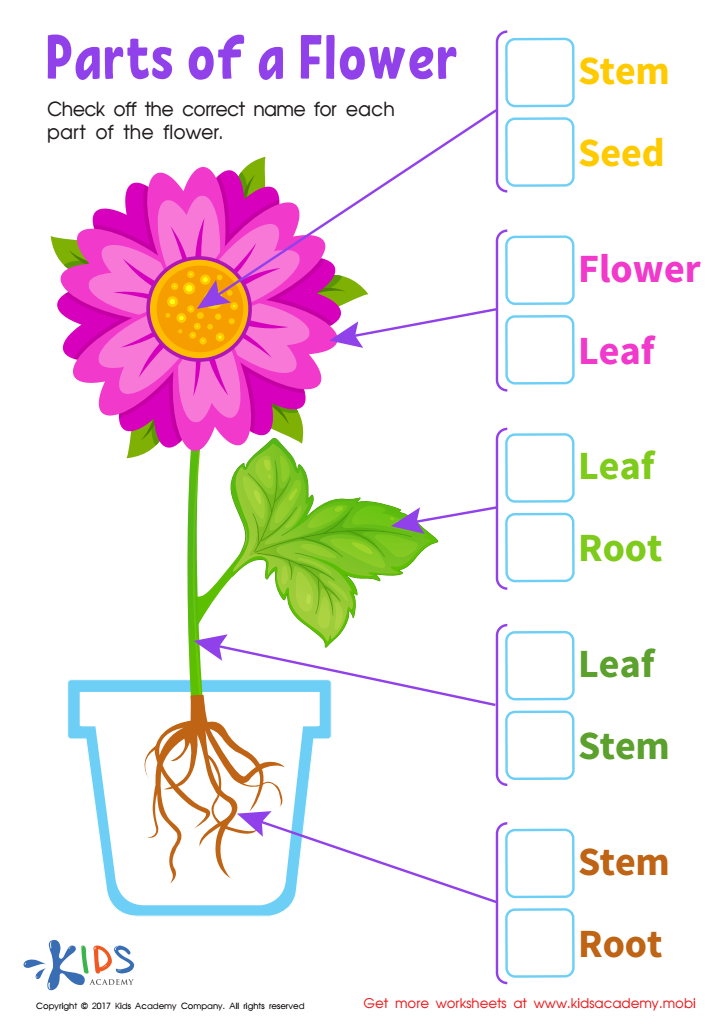Explore Life Science with Engaging Printable Worksheets for Kids - Discover the World Around Us!
3 filtered results
-
From - To
Useful Life Science Worksheets for Kids
Introduce young learners to the wonders of living things with our Life Science worksheets for Kindergarten and Grade 1. These worksheets are expertly designed to engage children and are a perfect tool for building a solid foundation in life science concepts. Our worksheets offer a variety of topics, including plant and animal life cycles, habitats, and food chains. Children will also learn about the different body parts of animals, how plants grow and adapt, and the importance of conservation. With colorful illustrations and fun activities, these worksheets are an essential resource for teachers and parents alike. Discover the joy of learning with our Life Science worksheets!


Parts Flower Printable


Herbivores Printable


Carnivores Worksheet
The Importance of Life Science Worksheets for Young Learners
Life Science worksheets are a great way to introduce young learners to the world around them, from the smallest bugs to the biggest animals. Designed for Kindergarten and Grade 1 levels, these worksheets provide engaging activities and interactive exercises that will teach children about living things, ecosystems and the environment.
The purpose of Life Science worksheets is to help children develop a better understanding of the living world, while also developing their critical thinking skills, creativity and problem-solving skills. Each worksheet is carefully designed to provide opportunities for children to learn, explore and discover the natural world in a fun and exciting way.
One of the benefits of using Life Science worksheets is that they are designed to be age-appropriate and easy to understand. Kindergarten children can learn about basic concepts such as plants, animals and habitats, while Grade 1 students can delve deeper into concepts such as life cycles, food chains and ecosystems.
Life Science worksheets provide a hands-on experience that allows children to explore and experiment with different ideas. With the help of worksheets, children can engage in activities that encourage them to think creatively and critically. For example, they can identify different animals and their habitats, while also learning about their unique characteristics. They can also explore the food chain, predator-prey relationships, and how different ecosystems are interdependent.
Furthermore, Life Science worksheets allow children to learn at their own pace. These worksheets provide a structured learning environment that gives children the freedom to explore different concepts and ideas without feeling overwhelmed or pressured. This approach allows children to learn and grow at their own pace, which helps them develop a sense of autonomy and confidence.
Additionally, Life Science worksheets provide an opportunity for children to develop their vocabulary and language skills. With the help of informative worksheets, students can learn about new animals, plants and ecosystems, while also learning the names of different parts of plants and animals. The use of descriptive words and phrases helps children to construct effective sentences and express their ideas clearly and effectively.
Finally, Life Science worksheets are also an excellent tool for teachers and parents to assess the progress of their students. By using varied worksheets, teachers can gain deeper insights into how their students are processing the information and adjust their teaching methodologies accordingly.
In conclusion, Life Science worksheets play a vital role in introducing young learners to the natural world around them. With age-appropriate activities and interactive exercises, children can learn about different living things, habitats, ecosystems and environmental issues, whilst also developing critical thinking, problem-solving and language skills.

 Assign to My Students
Assign to My Students




















